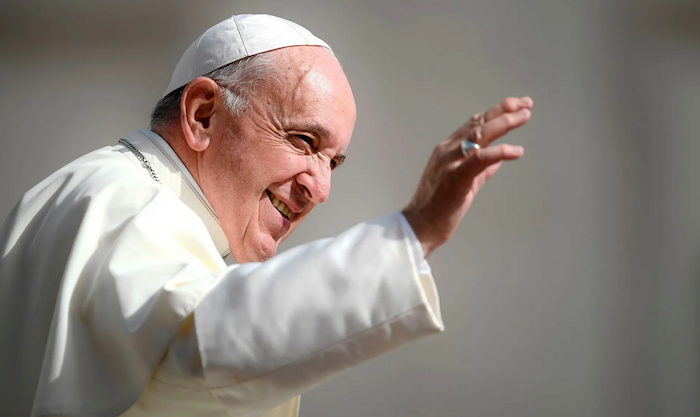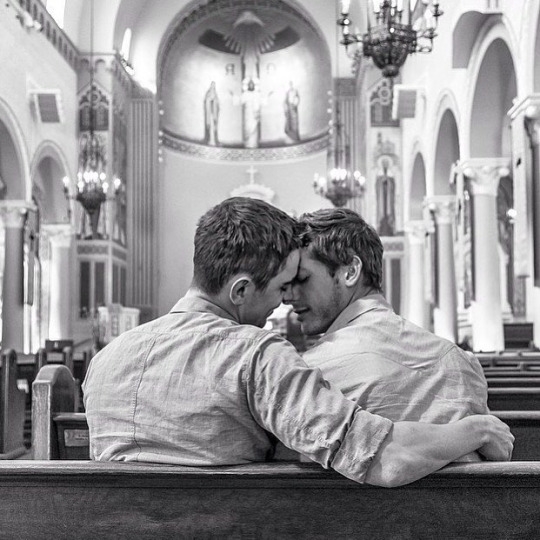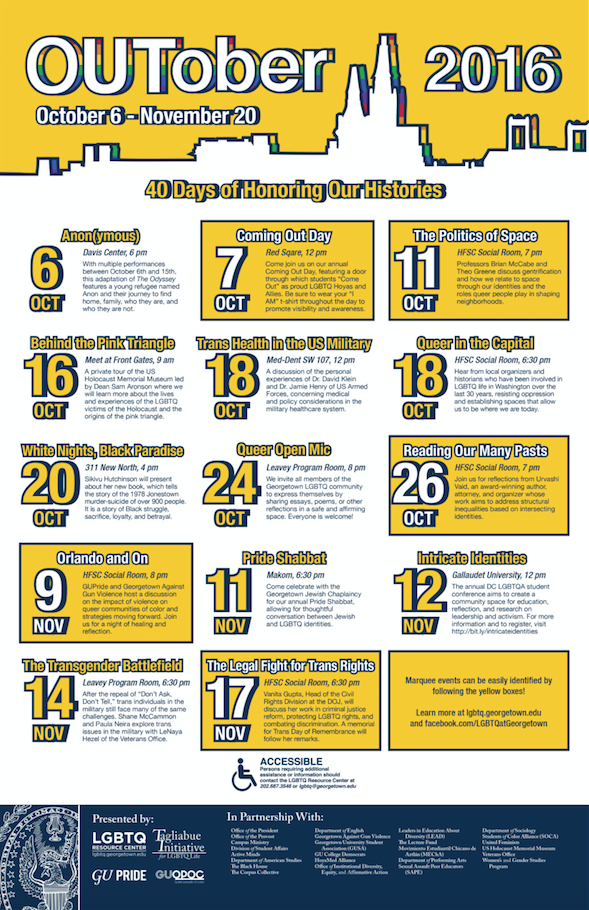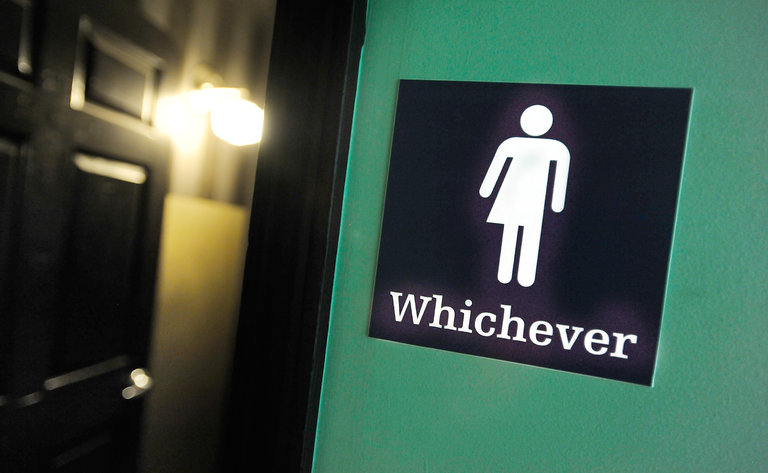By Michael O’Loughlin

Tens of thousands of Catholics descend on Los Angeles each winter to sharpen their ministry skills, partaking in dozens of workshops and seminars about liturgy, prayer, Bible, and parish life as part of the LA Religious Education Congress. With close to 40,000 participants, it’s the largest annual gathering of Catholics in North America, a celebration of all things Catholic.
But event organizers this year took a cue from popular culture and included a new session, one that attracted a standing room only crowd of 750 people, nearly all of whom jumped to their feet for a sustained round of applause after talks from two young, committed Catholics.
The name of the session? “Transgender in the Church: One Bread, One Body.”
The Rev. Christopher Bazyouros, the director of the office of religious education for the Archdiocese of Los Angeles, said including the discussion in the program was an important first step for the Church in grappling with an issue that exploded onto the national consciousness last June when Caitlyn Jenner appeared on the cover of Vanity Fair, announcing to the world that she is transgender.
“There aren’t many places for Catholics to discuss these things that are thoughtful, intentional, and that gathers people who have had this experience,” he said. “Many Catholics want information about this topic, they want things to help them understand this situation.”
To that end, conference organizers invited two transgender Catholics to speak, both of whom were surprised and gratified that they were included. And both used their presentations to urge acceptance by the wider universe of Catholics.
Anna Patti, a 23-year-old Michigan resident, told the crowd she didn’t believe “God made a mistake” with her, as some have said of transgender people.
In an interview after her presentation, she said having the opportunity to speak freely about her struggles and her joys was “an unexpectedly affirming experience.”
“I hadn’t realized how silenced I felt within the Church,” she said. “At Mass I always sit in the back row in the back corner, making myself as visibly small as possible. Here was the opposite, where people wanted to learn about an issue that is so often immediately condemned.”
“It was beautiful,” she said of the crowd’s reaction.
Mateo Williamson, a 24-year-old medical student at the Jesuit-run Loyola Medical School in Chicago, described with joy his deeply Catholic upbringing, part of a family that included several priests and nuns.
After his talk, he said many young people thanked him for sharing his story about living as a transgender man in the Church.
“Pope Francis’ charity, compassion, and call to mercy, it’s changed the tone in the Church,” he said. “He hasn’t been explicit about trans people, and there’s nothing in the Catechism, but there’s been a change among people in general to understand something they maybe haven’t encountered before.”
Pope Francis has spoken out repeatedly against so-called gender ideology, but Patti said she doesn’t interpret those comments as hostile to trans people. In fact, she thinks the pope’s remarks about gender not being just a social construct actually support the transgender community by pointing out that gender identity is innate.
While Catholicism doesn’t have much to say about transgender issues, at least not at the level of Church teaching, there is still tension about how the Church should respond to its transgender members.
In Rhode Island, for example, a Catholic middle and high school came under fire after a group of alumni discovered transgender students were banned from enrolling. Once confronted, school organizers promised to take another look at the policy.
This kind of uncertainty about how well the Church is equipped to deal with the needs of transgender Catholics and their families is part of the reason event organizers included the session, as a way to launch a conversation by inviting people to share their personal stories.
“We were just going with the pope’s desire to go out and encounter people, to hear their stories,” said Bazyouros, the LA priest who oversees the Congress. “We decided to see what would happen if we hosted a session for people to share their stories.”
“Sometimes issues are just these abstract things until you hear people speak about their journeys, and then you can begin to have a conversation,” he said.
Patti said that her Catholic faith has been central in her own journey, but that the culture war threatens the Church’s ability to help other transgender people.
“Catholic spirituality and the Catholic tradition can provide more nourishment, and also more sense into the trans experience, than anything else I’ve encountered,” she said.
“On the other hand, I think especially in American Catholicism, the culture war has latched itself parasitically onto Catholicism and has turned it into a politics game,” she said. “I think it makes settings that would otherwise be ideal for a trans person’s development turns it into a coffin, into the worst place imaginable.”
She said the Church also suffers from an image problem in the LGBT community, which turns some people off from exploring their faith.
“Honestly, I get judged for being Catholic because it’s just assumed that to be Catholic means hating LGBT people, more so even than what is central to our faith, the Eucharist,” she said.
Williamson said that he’s had both good and bad experiences in the Church.
At Loyola, for instance, he’s part of a group of students who meet for several hours each week to explore how Ignatian spirituality relates to medicine.
But last year, he said, he was hurt when his invitation from the White House to be one of 15,000 people on the South Lawn when President Barack Obama formally welcomed Pope Francis to the White House was criticized by the right as inappropriate.
“It was discouraging, because I’m trying to bring about this positive message,” he said. “We don’t want people to think that trans Catholics are a threat to the sanctity of any event.”
The LA Congress workshop sold out quickly, and some of the audience, which included several priests, seminarians, and nuns, said the fact it happened at all gave them hope about the future of the Church.
“I used to work at a youth shelter, and I would do some work with transgender youth who would come to the house and I didn’t have a lot of experience, so I wanted to learn more,” said Laura Wagner, who coordinates service trips at a Los Angeles Catholic high school.
“It was comforting to be in an audience of Catholic men and women, lay people, nuns, and priests, especially when this isn’t talked about a lot,” she added. “To be among other people who were very accepting and welcoming, and wanting to hear more about the issue, it gave me a lot of hope for the future of the Church.”
Kevin Stockbridge, a graduate student from Orange County, said the session was important because marginalized voices often go unheard in the Church.
“The trans experience is invisible in the Church right now, and while it’s visible in our society, we don’t know how to deal with that theologically,” he said. “Often times we deal with that through silence, so I think it’s important to voice real spiritual experiences of trans persons.”
Arthur FitzMaurice, who speaks frequently about LGBT issues in the Church and who organized the workshop, said he believes it was the largest discussion devoted to transgender issues and Catholicism in the Church’s history. He said that organizers have already asked him to plan a similar workshop next year.
While thrilled with their reception in Los Angeles, both Patti and Williamson said the Church has a long way to go before it’s a welcoming place for transgender people, but that they hope the Congress session is a step in the right direction.
“You don’t have to be an expert to make a difference,” Williamson said. “We need all kinds of people, not just experts, but people who can just respond to families in supportive ways.”
Patti, too, said that there is room for experts, but that it’s really just about love.
“We are on the ground level,” Patti said. “There are theological discussions to be had, canonical issues to be considered, and even the trans movement itself is constantly evolving. Being transgender in Catholicism might look different from what being transgender in a secular movement.”
She added, “But as all that’s all developing, at the end of the day, it comes down to, are you willing to accept another human being, a child of God?”
Complete Article HERE!



 to members of the same sex. These sexual attractions are referred to in our current culture in terms of “identities” that define an individual. “Coming Out Day” celebrations serve to lead persons to embrace and be proud of those “identities,” which are rooted in sexual attractions and lifestyles considered either disordered or immoral by the Church.
to members of the same sex. These sexual attractions are referred to in our current culture in terms of “identities” that define an individual. “Coming Out Day” celebrations serve to lead persons to embrace and be proud of those “identities,” which are rooted in sexual attractions and lifestyles considered either disordered or immoral by the Church.

